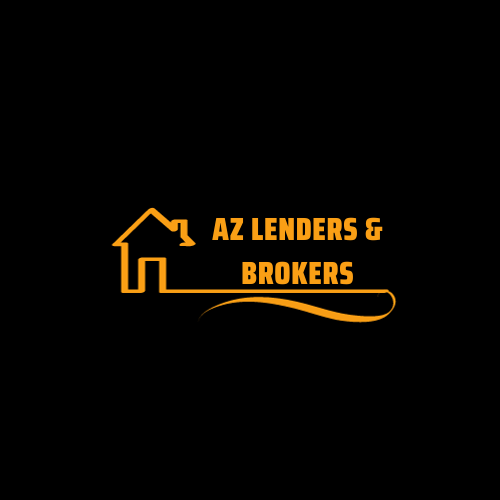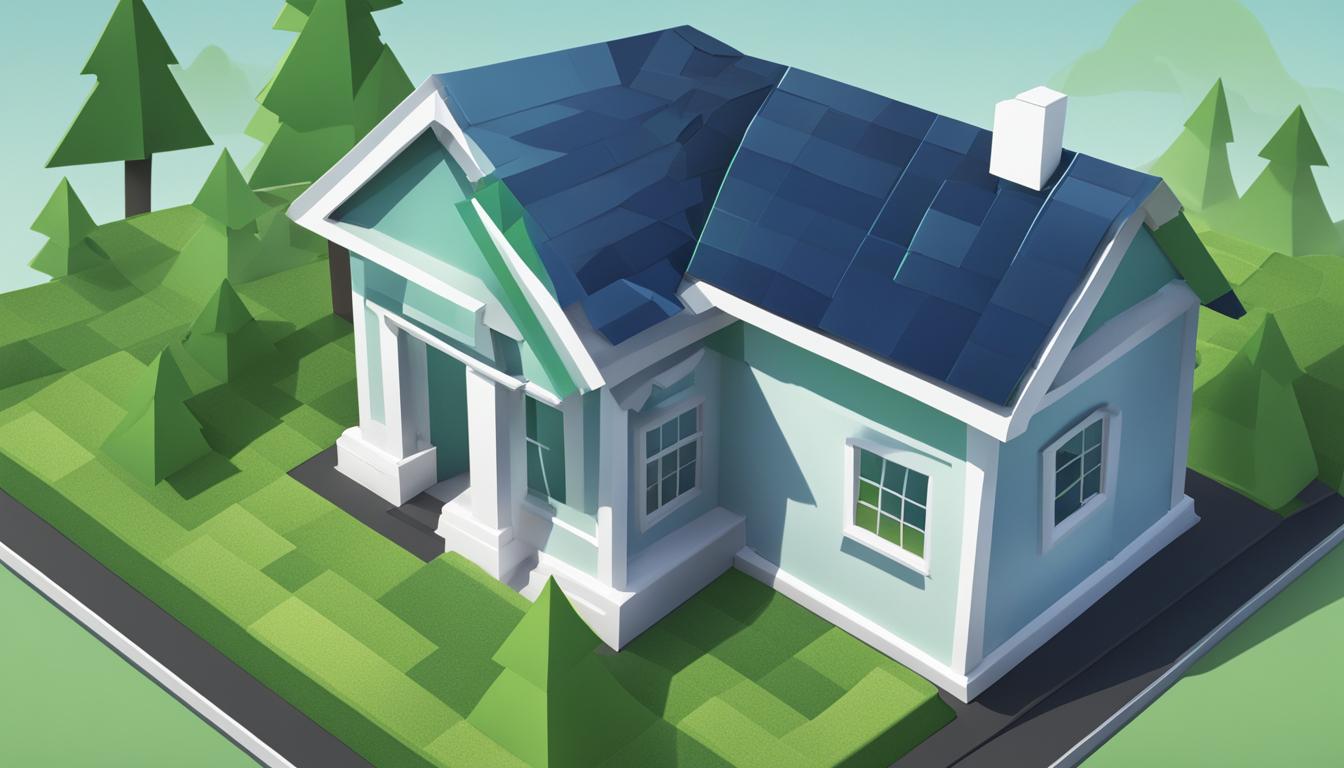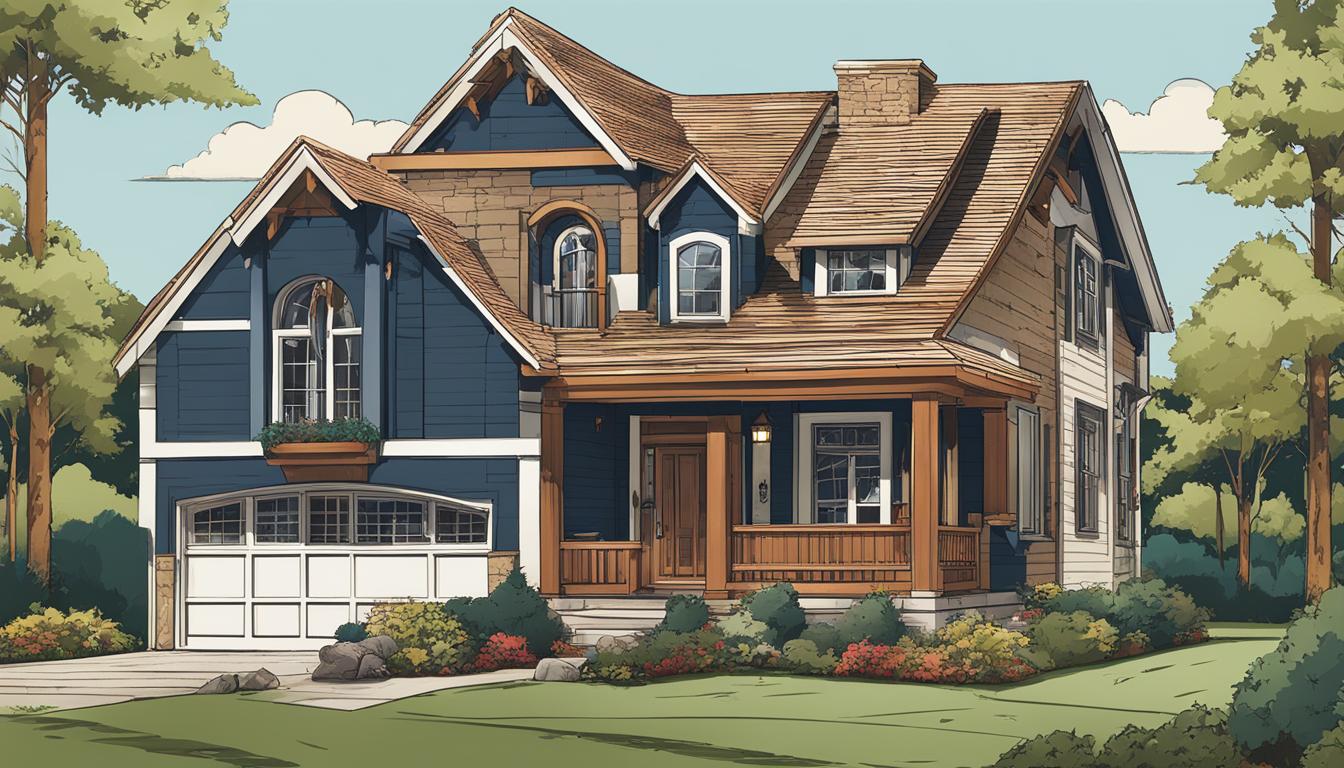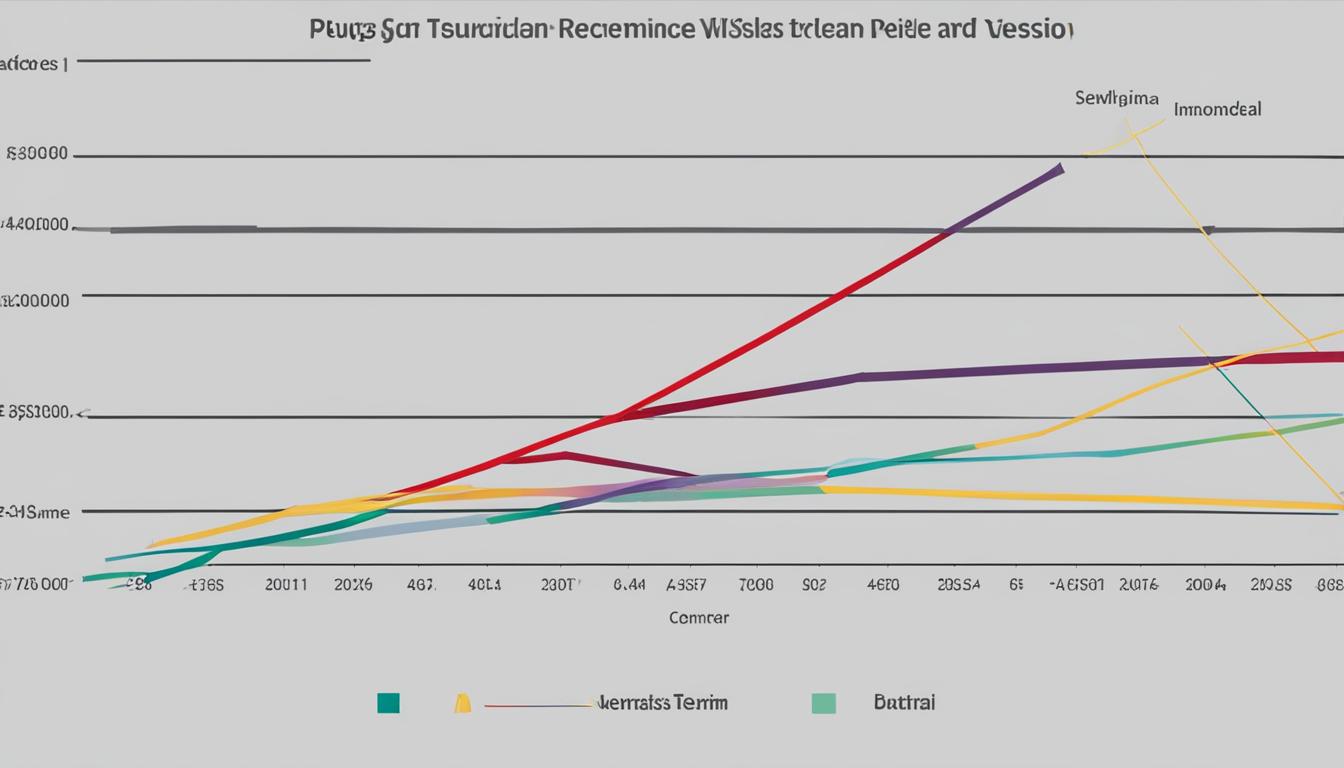Welcome to your comprehensive guide on the conventional loan process. If you’re considering obtaining a mortgage for your dream home or investment property, understanding the ins and outs of conventional loans is essential. In this guide, we’ll walk you through the basics of conventional loans, the requirements, different types of loans available, and how they differ from government loans. By the end, you’ll have the knowledge and confidence to navigate the conventional loan process successfully.
Key Takeaways:
- Conventional loans are the most common form of mortgage loan in the United States, offering flexibility in property types.
- Fixed-rate and adjustable-rate loans are the two main types of conventional loans.
- Requirements for conventional loans include a minimum credit score, maximum debt-to-income ratio, and a down payment.
- There are different types of conventional loans, such as conforming loans, jumbo loans, and non-QM loans.
- Conventional loans differ from government loans, like FHA loans, in terms of requirements and mortgage insurance.
What is a Conventional Loan?
A conventional loan is a mortgage that is available through and backed by a private sector lender. Unlike government-insured loans, which are backed by a federal institution or agency, conventional loans are not guaranteed by the government. They are the most common type of home loan and can be obtained from various types of mortgage lenders, including banks, credit unions, and online mortgage companies. Conventional loans can be either fixed-rate or adjustable-rate, depending on the borrower’s preference.
Conventional loans offer borrowers more flexibility in terms of the type of property that can be financed. They can be used to finance a primary residence, investment property, or second home. This makes them a versatile option for borrowers with different real estate goals. Additionally, conventional loans have stricter requirements compared to government-backed loans, but they also provide more flexibility in terms of loan terms and property types.
Overall, a conventional loan is a popular choice among borrowers due to its availability from various lenders, flexibility in property financing, and the potential for competitive interest rates. Whether you are purchasing your first home, investing in real estate, or looking for a second home, a conventional loan may be the right option for you.
What is a Conventional Loan?
A conventional loan is a mortgage that is available through and backed by a private sector lender. Unlike government-insured loans, which are backed by a federal institution or agency, conventional loans are not guaranteed by the government. They are the most common type of home loan and can be obtained from various types of mortgage lenders, including banks, credit unions, and online mortgage companies. Conventional loans can be either fixed-rate or adjustable-rate, depending on the borrower’s preference.
Key Points:
- Conventional loans are mortgages available through and backed by private sector lenders.
- They are not guaranteed or insured by the government.
- Conventional loans can be used to finance different types of properties, including primary residences, investment properties, and second homes.
- They offer more flexibility in terms of loan terms and property types compared to government-backed loans.
Whether you are looking to buy your first home, invest in real estate, or purchase a second home, a conventional loan may be the right choice for you. It is important to understand the requirements and options available to make an informed decision about your mortgage financing.
| Pros | Cons |
|---|---|
| Flexible loan terms | Stricter requirements |
| Various property financing options | No government guarantee |
| Potential for competitive interest rates | May require a higher credit score |
Conventional Loan Requirements
If you’re considering applying for a conventional loan, it’s important to know the requirements set by lenders. Meeting these requirements will increase your chances of approval and help you secure the financing you need. Here are the key factors to consider:
Credit Score
Most lenders require a minimum credit score of 620 for a conventional loan. However, having a higher credit score will improve your chances of getting approved and may also result in better interest rates. Make sure to check your credit score and take steps to improve it if necessary before applying.
Debt-to-Income Ratio
The debt-to-income ratio (DTI) is an important factor that lenders consider when assessing your eligibility for a conventional loan. Your DTI represents your monthly debt payments as a percentage of your gross monthly income. Typically, lenders prefer a DTI of 45% or lower, although some may allow up to 50%. It’s essential to keep your DTI as low as possible to demonstrate your ability to manage your debt responsibly.
Down Payment
Conventional loans usually require a minimum down payment of 3% of the purchase price. However, it’s advisable to aim for a 20% down payment to avoid private mortgage insurance (PMI). A higher down payment also demonstrates to lenders that you have more equity in the property, making you a more attractive borrower.
| Requirement | Minimum | Preferred |
|---|---|---|
| Credit Score | 620 | Higher for better rates |
| DTI | 45% | Lower is better |
| Down Payment | 3% | 20% (to avoid PMI) |
Meeting the conventional loan requirements is crucial for a successful loan application. By understanding and preparing for these requirements, you can put yourself in the best position to secure the financing you need for your dream home or investment property.
Types of Conventional Loans
When it comes to conventional loans, there are different types available to borrowers depending on their specific needs and qualifications. Understanding these types can help you make informed decisions and choose the right loan for your situation.
Conforming Loans
Conforming loans are conventional loans that meet the guidelines set by Fannie Mae and Freddie Mac, the government-sponsored enterprises that buy loans from lenders. These loans adhere to specific loan limits set by the Federal Housing Finance Agency, which vary by county. Conforming loans are usually more easily accessible and often come with favorable interest rates.
Jumbo Loans
Jumbo loans, on the other hand, exceed the conforming loan limits and are not eligible to be bought by Fannie Mae or Freddie Mac. These loans are typically used to finance high-value properties or in areas with higher home prices. Jumbo loans often have stricter requirements and may come with higher interest rates.
Non-Qualified Mortgages (Non-QM Loans)
Non-qualified mortgages, or non-QM loans, are conventional loans that do not meet the traditional underwriting standards for conforming loans. These loans are not eligible to be purchased by Fannie Mae or Freddie Mac. Non-QM loans can be an option for borrowers who may not meet the strict criteria of conforming loans, such as those with unique financial situations or lower credit scores.
| Loan Type | Description |
|---|---|
| Conforming Loans | Conventional loans that meet Fannie Mae and Freddie Mac guidelines and adhere to specific loan limits |
| Jumbo Loans | Conventional loans that exceed the conforming loan limits and are used for high-value properties or in areas with higher home prices |
| Non-Qualified Mortgages (Non-QM Loans) | Conventional loans that do not meet the traditional underwriting standards for conforming loans |
How Conventional Loans Differ from Government Loans
When considering financing options for your home purchase, it’s important to understand the differences between conventional loans and government-backed loans such as FHA loans. While both types of loans serve the purpose of providing funding for home purchases, they have distinct features and requirements.
Conventional loans, unlike government-backed loans, are not insured or guaranteed by the government. This means that lenders take on more risk when offering conventional loans, which is reflected in the loan requirements. Conventional loans typically have stricter credit score and down payment requirements compared to FHA loans.
One key difference between conventional loans and FHA loans is the down payment. Conventional loans usually require a minimum down payment of 3%, although a higher down payment is preferred to avoid private mortgage insurance. On the other hand, FHA loans allow for a lower down payment, often as low as 3.5%, making them more accessible to borrowers with limited funds for a down payment.
Another difference is the mortgage insurance requirement. Conventional loans allow borrowers to cancel private mortgage insurance once they reach 20% equity in their homes. In contrast, FHA loans have upfront mortgage insurance premiums as well as annual premiums that are paid for the life of the loan. This means that borrowers with conventional loans may be able to save on mortgage insurance costs in the long run.
Overall, the decision between a conventional loan and an FHA loan depends on your individual financial situation and goals. Conventional loans offer more flexibility and potential cost savings in the long run, while FHA loans provide more accessible down payment options. It’s important to carefully evaluate your options and consult with a mortgage professional to determine the best loan for your needs.
Preparing to Apply for a Conventional Loan
Before applying for a conventional loan, it’s important to take certain steps to prepare yourself financially. This will not only increase your chances of getting approved for the loan but also help you secure better interest rates and loan terms. Here are some key considerations to keep in mind:
- Gather information about loan programs: Research and gather information about different loan programs offered by lenders. This will help you understand the options available and choose the one that best suits your needs.
- Estimate the down payment: Determine the amount of down payment you can afford. While conventional loans typically require a minimum of 3% down payment, a higher down payment can lower your monthly payments and eliminate the need for private mortgage insurance.
- Consider the type of loan: Decide whether you want a fixed-rate or adjustable-rate loan. A fixed-rate loan offers stable monthly payments, while an adjustable-rate loan may have a lower initial interest rate but can fluctuate over time.
- Compare interest rates and APRs: Shop around and compare interest rates and annual percentage rates (APRs) offered by different lenders. This will help you find the most competitive rates and terms.
- Check and improve credit scores: Check your credit scores and take steps to improve them if necessary. A higher credit score can qualify you for better interest rates and loan terms.
- Get preapproved: Consider getting preapproved for a loan before starting your property search. Preapproval shows sellers that you are a serious buyer and can strengthen your offer.

By taking these steps to prepare for a conventional loan application, you’ll be in a stronger position to secure the financing you need for your dream home or investment property. Remember to gather all the required documentation, including identification documents, bank statements, pay stubs, and tax returns, to streamline the application process and ensure a smooth experience.
Disclaimer: The information provided in this article is for informational purposes only and does not constitute financial advice. Please consult with a professional financial advisor or lender for specific guidance regarding your individual situation.
Conventional Mortgage Application: Decisions to Make
When you’re ready to apply for a conventional loan, there are several key decisions you’ll need to make to ensure that you choose the right mortgage for your needs. These decisions will impact your loan terms, payment structure, and overall financial goals. By carefully considering each option and understanding its implications, you can make informed choices that align with your objectives.
Firstly, you’ll need to decide whether you want a fixed-rate or adjustable-rate loan. A fixed-rate loan offers the stability of a consistent interest rate throughout the life of the loan, providing predictable monthly payments. On the other hand, an adjustable-rate loan, also known as an ARM, typically has a lower initial interest rate that adjusts periodically based on market conditions. This option may be more suitable if you plan to sell or refinance your home within a few years.
Another decision to consider is the amount of your down payment. While conventional loans generally require a minimum down payment of 3%, you may choose to put down a higher percentage to reduce your monthly mortgage payments or avoid private mortgage insurance (PMI). Keep in mind that a higher down payment may require more upfront funds but can lead to long-term savings.
Understanding closing costs is also essential. These expenses include fees for appraisals, inspections, title insurance, and loan origination. They can vary depending on the lender and your location. You’ll need to weigh these costs against the benefits of the loan and factor them into your overall budget.
In addition to these considerations, there are other aspects to think about, such as the loan term and payment structure. The loan term refers to the length of time you have to repay the loan, typically ranging from 15 to 30 years. It’s important to select a term that aligns with your financial goals and budget. The payment structure, whether it’s a standard monthly payment or a bi-weekly payment plan, can also impact your overall repayment strategy.
By carefully considering these decisions during the conventional mortgage application process, you can customize your loan to fit your unique financial circumstances and goals. Remember to consult with a reputable lender and seek professional advice when needed to ensure that you make informed choices that set you up for long-term success.
Credit Scores and DTIs for Conventional Loans
When applying for a conventional loan, your credit score and debt-to-income ratio (DTI) are crucial factors that lenders consider. Your credit score is a numerical representation of your creditworthiness, indicating how likely you are to repay your debts. A higher credit score generally leads to better interest rates and loan terms. Lenders typically require a minimum credit score of 620 for conventional loans, although having a higher score can give you access to more favorable rates.
Your DTI, on the other hand, is a comparison of your monthly debt payments to your gross monthly income. It is a measure of your ability to manage your debt and make timely mortgage payments. To qualify for a conventional loan, your DTI should generally be below 45%. However, some lenders may allow a DTI of up to 50% depending on other factors such as a high credit score or a larger down payment.
It is important to monitor your credit score and manage your debt responsibly to improve your chances of getting approved for a conventional loan. You can check your credit score regularly and take steps to correct any errors on your credit report. Additionally, paying down existing debts and avoiding new debt can help lower your DTI and demonstrate your financial stability to lenders.
Remember, a higher credit score and a lower DTI can increase your chances of qualifying for a conventional loan with favorable terms. Take the time to review your credit report, improve your credit score, and manage your debts effectively to position yourself as a strong candidate for a conventional loan.
Alternative Options to Conventional Loans
If you are unable to qualify for a conventional loan, don’t worry! There are alternative options available to help you secure financing for your dream home. These alternative options include government-backed loans such as FHA loans, VA loans, and USDA loans.
FHA loans are ideal for borrowers with less-than-perfect credit. They have more lenient credit score requirements and allow for a lower down payment compared to conventional loans. VA loans, on the other hand, are available to active-duty military members and veterans. They offer competitive interest rates and flexible qualification criteria. Lastly, USDA loans are designed for low to moderate-income borrowers in rural areas. They provide attractive interest rates and low or no down payment options.
When considering these alternative options, it’s important to understand that each loan program has its own set of requirements and qualifications. Take the time to research and compare the different options to determine which one best fits your needs and financial situation.
In summary, if a conventional loan is not an option for you, don’t give up! Explore alternative options such as FHA loans, VA loans, and USDA loans. These programs offer different benefits and may have requirements that better align with your circumstances. Remember to consult with a trusted mortgage professional who can guide you through the process and help you make an informed decision.
Limits on Conventional Loans
When it comes to conventional loans, there are certain limits that borrowers need to be aware of. These limits determine the maximum loan amount that can be borrowed under the conventional loan program. Conventional loans can be classified into two categories: conforming loans and non-conforming loans.
Conforming loans are those that meet the guidelines set by Fannie Mae and Freddie Mac, the government-sponsored enterprises that buy loans from lenders. These loans have maximum limits set by the Federal Housing Finance Agency (FHFA), which vary by county. The FHFA adjusts these limits annually to reflect changes in home prices. In general, conforming loan limits range from $548,250 to $822,375 for single-unit properties, depending on the location of the property.
On the other hand, non-conforming loans do not meet the guidelines set by Fannie Mae and Freddie Mac and therefore do not have set limits imposed by the government. One common type of non-conforming loan is a jumbo loan, which exceeds the conforming loan limits. Jumbo loans are typically used for high-value properties and may require a larger down payment and stricter qualification criteria.
| Loan Type | Maximum Loan Amount |
|---|---|
| Conforming Loan | $548,250 to $822,375 (varies by county) |
| Jumbo Loan (Non-conforming) | Exceeds conforming loan limits |
Understanding the limits on conventional loans is important for borrowers as it helps them determine the loan amount they can qualify for and the type of loan that best suits their needs. It is recommended to consult with a mortgage lender or broker who can provide detailed information about the loan limits in your specific area and help guide you through the loan application process.
Benefits of Conventional Loans
Conventional loans offer several advantages to borrowers that make them a popular choice for financing a home purchase. Whether you’re looking to buy your primary residence, invest in a property, or purchase a second home, conventional loans provide the flexibility you need.
One of the key benefits of conventional loans is the variety of loan terms available. You can choose between fixed-rate and adjustable-rate options based on your preference and financial goals. With a fixed-rate loan, your interest rate remains the same throughout the term of the loan, providing stability and predictability in your monthly payments. On the other hand, an adjustable-rate loan offers an initial lower interest rate, which can be beneficial if you plan to sell or refinance the property before the rate adjusts.
Borrowers with good credit scores also benefit from lower interest rates on conventional loans. A higher credit score demonstrates your creditworthiness and can help you secure a more favorable rate. Additionally, conventional loans allow borrowers to cancel private mortgage insurance (PMI) once they reach 20% equity in their homes. This can save you money over the long term compared to government-backed loans, where mortgage insurance is often required for the life of the loan.
“Conventional loans provide the flexibility, loan term options, and potential savings that many borrowers are looking for when financing their home purchase.”
| Benefits of Conventional Loans: |
|---|
| Diverse financing options for different types of properties |
| Choice between fixed-rate and adjustable-rate loans |
| Lower interest rates for borrowers with good credit scores |
| Potential to cancel private mortgage insurance once reaching 20% equity |
Overall, conventional loans provide borrowers with the flexibility, loan term options, and potential savings that many are looking for when financing their home purchase. Whether you’re a first-time homebuyer or an experienced investor, it’s important to consider the benefits of conventional loans and explore your options to make an informed decision.
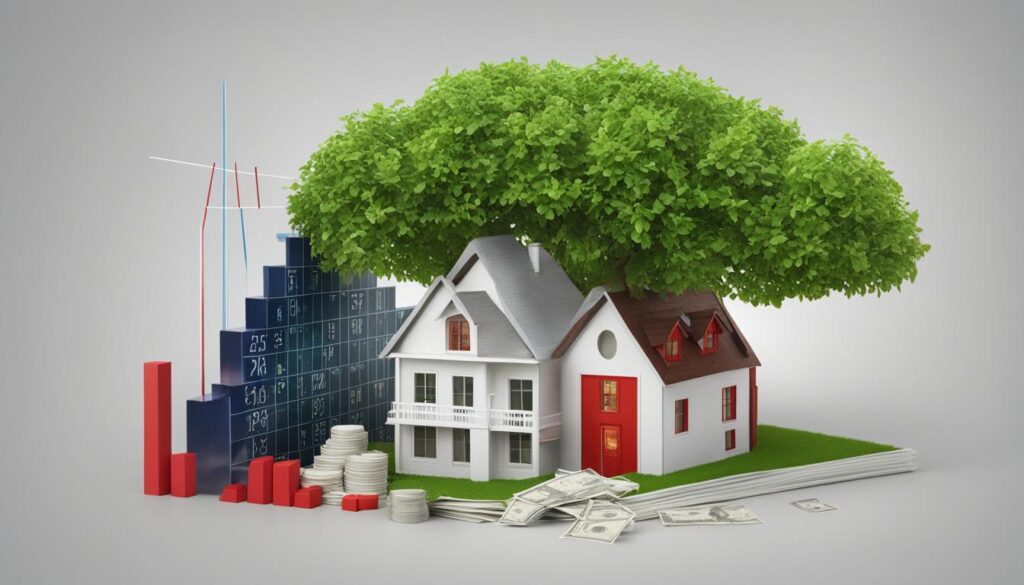
Conclusion
Now that you have a comprehensive understanding of the conventional loan process, requirements, and guidelines, you are well-equipped to embark on your home financing journey. Remember to gather all the necessary documentation, including identification, bank statements, pay stubs, and tax returns, to streamline the application process.
As you navigate the conventional loan process, it is crucial to work with reputable lenders who can guide you through the underwriting and closing process. Seeking professional advice when needed can help ensure a smooth and successful experience.
Whether you are purchasing a primary residence, investment property, or second home, conventional loans provide flexibility in terms of property type and loan terms. Maintaining a good credit score, managing your debt responsibly, and aiming for a 20% down payment can open up opportunities for lower interest rates and the ability to cancel private mortgage insurance.
Remember, obtaining a conventional loan is a significant step towards achieving your homeownership goals. With proper preparation and knowledge, you can confidently navigate the conventional loan process and secure the financing you need for your dream home.
FAQ
What is a conventional loan?
A conventional loan is a mortgage that is available through and backed by a private sector lender, rather than a government agency.
What are the requirements for a conventional loan?
To be approved for a conventional loan, borrowers typically need a minimum credit score of 620, a maximum debt-to-income ratio of 45%, and a down payment of at least 3% (although 20% is preferred).
What types of conventional loans are available?
Conventional loans come in two main types: fixed-rate and adjustable-rate. Fixed-rate loans have a consistent interest rate throughout the loan term, while adjustable-rate loans have an interest rate that can change over time.
How do conventional loans differ from government loans?
Conventional loans are not insured or guaranteed by the government, unlike government-backed loans such as FHA loans. While conventional loans have stricter requirements, they offer more flexibility in terms of the type of property that can be financed.
How can I prepare to apply for a conventional loan?
To prepare for a conventional loan application, gather information about loan programs, estimate your down payment amount, consider the type of loan you prefer, compare interest rates, check and improve your credit score, and get preapproved.
What role do credit scores and DTIs play in the approval process?
Credit scores and debt-to-income ratios are important factors in the approval process for conventional loans. While a minimum credit score of 620 is typically required, higher scores can access better interest rates. The debt-to-income ratio should not exceed 45% to qualify for a conventional loan.
What are the alternative options to conventional loans?
If you are unable to qualify for a conventional loan, alternative options include government-backed loans such as FHA loans, VA loans, and USDA loans. These loans have different requirements and qualifications compared to conventional loans.
Are there limits on conventional loans?
Conventional loans can be either conforming or non-conforming. Conforming loans meet the guidelines set by Fannie Mae and Freddie Mac and have maximum limits set by the Federal Housing Finance Agency. Non-conforming loans, including jumbo loans, do not meet these guidelines and do not have set limits imposed by the government.
What are the benefits of conventional loans?
Conventional loans offer flexibility in terms of the type of property that can be financed, a variety of loan terms including fixed-rate and adjustable-rate options, and the ability to cancel private mortgage insurance once the borrower reaches 20% equity in their home.
